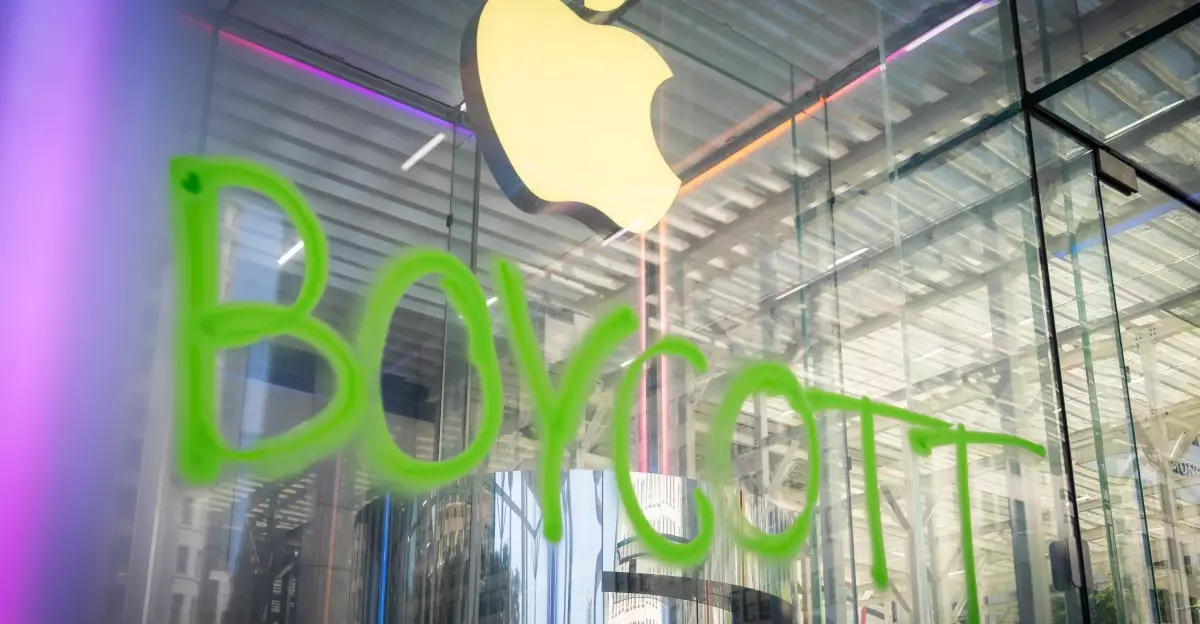In recent years, the narrative surrounding Big Tech’s commitment to environmental sustainability has been increasingly scrutinized. Companies like Apple, Google, and Microsoft have championed their green initiatives publicly, projecting an image of environmental responsibility. However, beneath this polished facade lies a troubling disconnect between their rhetoric and their actions. The recent protest in New York City exemplifies this hypocrisy, with activists exposing the contradictions embedded within the tech industry’s environmental claims. These corporations often tout their efforts to combat climate change, yet their political endorsements and lobbying efforts tell a different story. By supporting administrations and policies that undermine environmental protections, they reveal a stark contrast between their corporate social responsibility promises and their influence on climate policy. The protestors’ message — “Tim + Trump = Toxic” — underscores this irony: the same leaders who publicly advocate for sustainability actively back political figures who promote fossil fuels and rollback climate regulations.
The reality is that these companies’ commitments are often superficial, designed to appease consumers and stakeholders without challenging the entrenched economic interests that fuel environmental degradation. Their involvement in political endorsements and strategies suggests a quid pro quo that prioritizes profit over planetary health. The activism confronting this facade seeks to unravel the illusion and demand accountability from corporations that capitalize on environmental causes without truly implementing meaningful change.
Political Alliances as Obstacles to Genuine Climate Action
The public endorsement of political figures like Donald Trump by major tech CEOs raises fundamental questions about the sincerity of their climate commitments. Despite their claims to support the Paris Agreement and other environmental initiatives, many executives continue to align themselves with policies and leaders actively dismantling the very protections they claim to champion. The symbolic act of spray-painting “Boycott” beneath an Apple logo becomes more than just vandalism; it is a radical call for transparency and integrity from corporations that wield immense influence over public policy.
The complicity of these companies in supporting administrations that promote fossil fuel interests undermines global efforts to mitigate climate change. It reveals a troubling alliance where economic incentives and political favoritism overshadow environmental stewardship. By backing politicians who diminish environmental regulations, these tech giants inadvertently contribute to the acceleration of climate crisis, contradicting their public statements and mission statements. The protestors’ challenge highlights the urgent need for consumers and activists to scrutinize not just what companies claim to do, but how their political actions affect the future of our planet.
The Environmental Cost of Technological Expansion
The increasing energy demands driven by technological growth, especially the rise of artificial intelligence, further complicate the narrative. Tech giants are pouring resources into expanding their data centers and AI capabilities—investments that come with significant environmental costs. Reports indicate that Google’s carbon emissions have risen substantially in recent years, and similar trends are observed across the industry. The rapid expansion of AI, often lauded for its innovation, paradoxically compounds the energy consumption problem, often exceeding emissions associated with other high-profile sectors like cryptocurrency.
This growth presents a dilemma: how can these companies reconcile their technological ambitions with the urgent need to reduce their carbon footprint? The answer lies in genuine commitment and radical transparency, yet too often these efforts are overshadowed by political alliances and profit-driven motives. Intactivating the sector’s future requires a relinquishment of superficial sustainability claims and a wholehearted embrace of real, transformative action—a challenge that few industry leaders seem willing to face honestly.
The protest at Apple’s flagship store exposes a broader societal issue: the discrepancy between corporate narratives of environmental responsibility and their real-world political and economic actions. As activists risk arrest to spotlight this hypocrisy, it becomes clear that mere green marketing will not suffice. True change demands a fundamental reevaluation of corporate priorities, political influence, and the environmental impact of technological progress. The question remains: are tech giants willing to sacrifice short-term profits and political gains for the genuine pursuit of a sustainable future? If not, their green promises will continue to be merely illusions, serving only as a veneer to mask deeper complicity in climate destruction.


Leave a Reply